Iranian Foreign Minister Ali Akbar Salehi met Thursday with International Envoy to Syria Lakhdar Brahimi and stressed that the Syrian crisis requires an internal Syrian solution which includes a national dialogue.
Iranian Foreign Minister Ali Akbar Salehi met Thursday with International Envoy to Syria Lakhdar Brahimi and stressed that the Syrian crisis requires an internal Syrian solution which includes a national dialogue.
During the meeting, which was part of a series of meetings that the Iranian foreign minister held during his visit to Cairo, Salehi and Brahimi discussed the latest regional developments, President Bashar Al-Assad’s roadmap for peace, as well as Iran’s peace proposal on Syria.
 According to the Turkish “Anadolu” news agency, the two parts discussed the possibility that an “Islamic country” becomes a news mediator in solving the Syrian crisis.
According to the Turkish “Anadolu” news agency, the two parts discussed the possibility that an “Islamic country” becomes a news mediator in solving the Syrian crisis.
Quoting a diplomatic source, the news agency stated that “a new mediator, that is not related to any part, and is accepted by the government and opposition, should initiate in a dialogue with the Syrian authorities.”
On another hand, Salehi highlighted the importance of exerting great efforts to put an end for the Syrian crisis, and expressed his country’s readiness to cooperate with Brahimi to achieve this goal.
For his part, the international envoy referred to the leading role Iran plays in the region, indicating that “all bids and plans should protect the interests of the Syrian people and government”.
During the visit, Salehi also met with Egyptian President Mohammad Mursi, Arab League Secretary General Nabil Al-Arabi, and Egyptian Foreign Minister Mohammad Kamel Amr.
In a joint press conference with his Egyptian counterpart, Salehi indicated that "foreign countries don't want the best for us, so we must work to find a Syrian solution to the crisis.”
In another context, Salehi told reporters after his meeting with Amr that the Islamic Republic “is paying the price of its stance on the Palestinian cause,” emphasizing that “sectarian talks don’t serve the region’s benefits.”
“If being a Sunni means following Prophet Mohammad’s Sunnah, than all the Iranian people are Sunnis; and if being a Shiite means loving the prophet and his household, than I believe that all the Egyptian people are Shiites,” Salehi concluded.